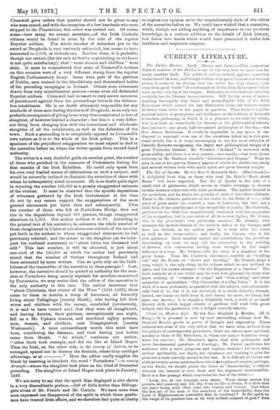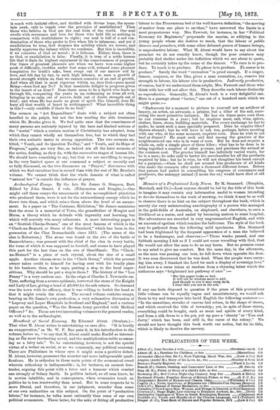Christ in Modern Life. By the Rev. Stopford A. Brooke.
(H. S. King.)—It is pleasant to note by each succeeding volume how Mr. Stopford Brooke grows in power of thought and expression. Those sermons are some of the very ablest that we have seen, at least from the pulpits of contemporary preachers; there are others more spiritual, notably so those of Mr. Robertson, in whom our author doubtless recog- nises his teacher ; Mr. Maurice's, again, deal with profeander and more fundamental questions of theology ; Mr. Ferrer captivates his audience with a more gorgeous and copious rhetoric ; yet here, also, neither spirituality, nor depth, nor eloquence are wanting to give the preacher a rank scarcely second to the hest. It is difficult to choose out of these twenty-seven sermons those which kave pleased us most; perhaps, on the whole, we should prefer the throe on "Immortality," a subject wherein the interest is over fresh and the argument inexhaustible. Here is a fine passage which concludes the last of the three :— "Look, too, at our tzitunpli over death. When decay usurps the powers, and memory and life slip from us like a dream, it is then that our inner being most often rises into beauty and victory. And when the last act of the man is the assertion of his immortality, does the Lord of Righteousness contradict him in contempt ? Is the spirit on the verge of its greatest loss at its very noblest moment of gain? does
it reach with faithful effort, and thrilled with divine hope, the moun- tain peak, only to topple over the precipice of annihilation? Then those who believe in God are the real fools of the world. Our soul swells with reverence and love for those who held life as nothing in comparison with truthfulness to right; our soul is full of a sad con- demnation of those who prefer to live when life is infamous; and yet if annihilation be true, God despises the nobility which we revere, and tacitly approves the infamy which we condemn. But this is incredible, if we conceive of God as moral : it is hideous. Either, then, there is no God, or annihilation is false. Finally, it is true of a noble human life that it finds its highest enjoyment in the consciousness of progress. Our times of greatest pleasure are when we have won some higher peak of difficulty, trodden under foot some evil, refused some pleasant temptation for truth's sake, been swept out of our narrow self by love, and felt day by day, in such high labours, so sure a growth of moral strength within us, that we cannot conceive of an end of growth. And when all that is most vigorous within us, does God—pure moral Being—does God say No? Is that insatiable delight in progress given to the insect of an hour ? Does there seem to be a Spirit who leads us through life, conquering the years in us, redeeming us from all evil, bringing in us calm out of sorrow, faith out of doubt, strength out of trial ; and when He has made us great of spirit like himself, does He bury all that wealth of heart in nothingness? What incredible thing is this ?—only credible if there be no God."
The sermon on "Art Expenditure" deals with a subject not often handled in the pulpit, but not the less needing the able treatment which Mr. Brooke gives it. We feel quite sure that the consciences of many persons are seriously injured by the bare and limited notions of the "useful" which a certain section of Christianity has adopted, from which they cannot wholly set themselves free, but to which they feel their own asathetic tastes in strong opposition. The two sermons en- titled, "Youth, and its Question To-Day," and Youth, and its Hope of Progress," again, are very fine, as indeed are all the later sermons of the series, dealing, as they do, with the successive stages of human life. We should have something to say, but that we are unwilling to reopen in the very limited space at our command a subject so recently and so fully discussed, on the two discourses on "Prayer," discourses with which we find ourselves less in accord than with the rest of Mr. Brooke's volume. We cannot think that the whole domain of what is called "natural law" is outside the influence of prayer.



































 Previous page
Previous page